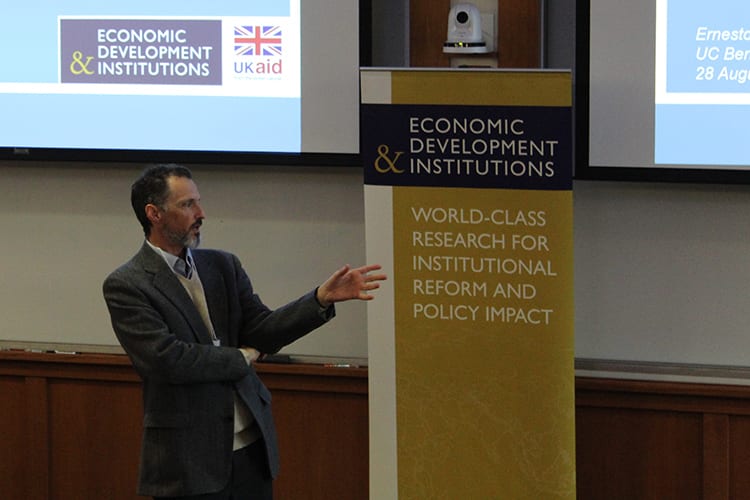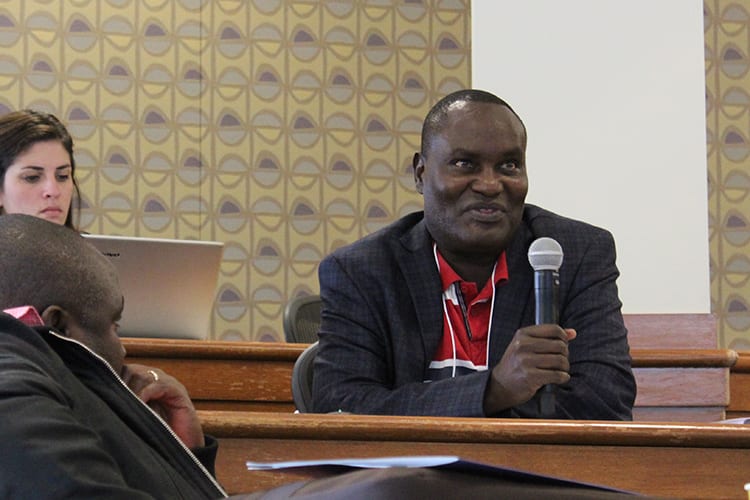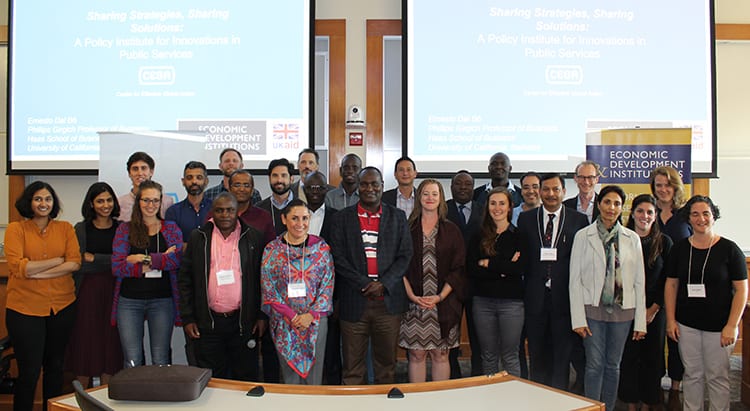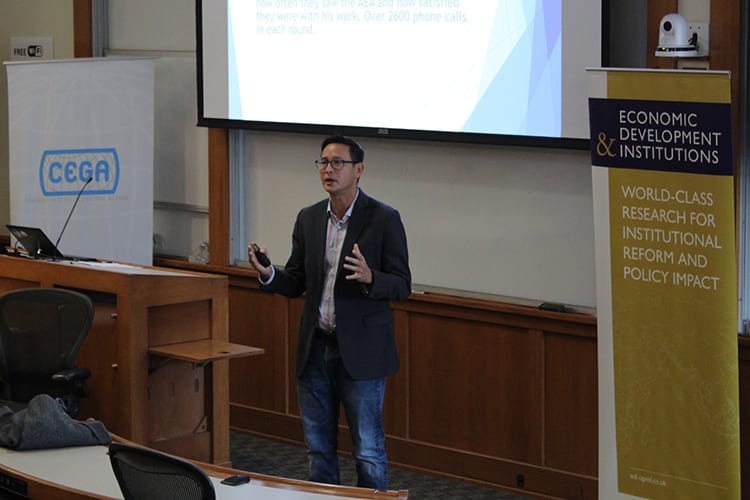In Afghanistan, where fake or “ghost” workers siphon off government paychecks and some rural teachers get paid through bursars who carry bags of cash to remote areas, can mobile money reduce corruption in public payrolls?
In Sierra Leone, where just 10 percent of households own a TV and opposition parties are weak, can screenings of videotaped candidate debates at large public gatherings help increase voter knowledge and improve candidates’ accountability?
Of these and the myriad efforts to reform public institutions in the developing world, which ones are proving to be most effective?
That was the central question occupying the researchers, funders, and “public sector entrepreneurs” from across the globe who gathered at the Haas School this week to share knowledge and strategies on how to achieve positive institutional change in developing nations.

Professors Ernesto Dal Bó and Frederico Finan, both from the Business and Public Policy group at Haas, convened the three-day forum as part of the Economic Development and Institutions (EDI) initiative, a five-year, $19 million international effort funded by UK Aid from the UK Department for International Development and managed by Oxford Policy Management. The professors, working with Berkeley’s Center for Effective Global Action (CEGA), are overseeing $5.5 million in randomized control trials of institutional reform efforts throughout the world in order to build on what works.
Public sector entrepreneurs
The forum brought together the people behind these evidence-based reforms to share progress and challenges, spark new research, and build connections. Visitors include high-level officials from the Mexico City Labor Court, the Judiciary of Kenya Law Reform Commission, the Uganda Ministry of Lands, Housing and Urban Development, Pakistan’s Punjab Commission on the Status of Women, the City of Dakar tax authority, and others.
“Over a number of years here at Berkeley we have been devoted to the study of the institutional roots of economic development,” Dal Bó said in his opening remarks. “We have learned that when you scratch beneath the surface, you find that behind every successful institutional reform project is an individual who, in some part of a public organization, decided that he or she had had enough and that something needed to change. In every single case there is a figure that we like to call a ‘public sector entrepreneur,’ who is somehow combining resources to make something happen.”

30 studies underway
Launched two years ago, the EDI initiative has already allocated allocated $5.5 million in funding to 30 randomized control studies involving 80 researchers across 12 countries, Dal Bó said. They include academics, research institutions, and reform-minded public organizations working to increase government transparency, accountability, and other reforms to political and legal systems.
Randomized control trials are considered the gold standard in field research, reducing bias and providing data on which reforms actually make a difference. EDI is focusing on programs that work closely with local institutions and government, rather than efforts by outside groups alone that may be less sustainable. While there are many initiatives funding impact evaluations in the developing world, EDI has a broader goal, Dal Bó said.
“We want to go beyond the individual impact evaluations and create linkages to build more cohesive, generalizable knowledge,” said Dal Bó, the Philips Girgich Professor of Business and an expert on government corruption and reform, who holds a joint appointment in the Political Science Department. “The other thing we want to do is put the lens on these public sector entrepreneurs and endow these people with instruments that might be helpful.”

Frontiers of evidence-based policy
The forum included interactive sessions with leaders of the studies that are underway, discussions about the state of science and open policy questions, funding priorities, and presentations from the “frontiers of evidence-based policy.” Two of the presenters were professors Katherine Casey of Stanford’s Graduate School of Business, who conducted the study of citizen engagement and election reforms in Sierra Leone, and Michael Callen of UC San Diego’s Rady School of Management, who led the experiment on using mobile money to fight corruption in Afghanistan (which was not funded by EDI but presented as an example of a large-scale public sector experiment).
Callen worked with the Afghan Ministries of Finance, Labor, and Education and the Office of the President to register all workers and then test whether paying them through mobile money would reduce the substantial “leakage” of government funds. The program was successful enough that Office of the President and the Ministry of Finance are bringing it to scale with the goal of paying all public employees using mobile money.
“The evidence-based smart policy movement is creating innovations at a remarkable pace,” he said. “But for something like this to succeed it needs to be anchored in government so that innovators can hand it over to implementers.”

Dal Bó and Finan, who act as the scientific leads for EDI’s randomized control trial program, also presented on their own research on reform efforts in Mexico and Paraguay. Their experiments (not funded by EDI) showed how financial rewards, and mobile technology, can help with the recruiting and monitoring of frontline public service workers. In one study, they rolled out mobile phones to the government agents who support small-scale farmers in Paraguay. They found the phones improved their performance, allowing them to not only document their farm visits but also for their government supervisors to track and monitor their locations.
The EDI program also includes research that takes stock the evidence on specific issues, development of a new diagnostic tool, and in-depth case studies. Other partners include Belgium’s University of Namur, the Paris School of Economics, and consulting firm Aide a la Decision Economique.